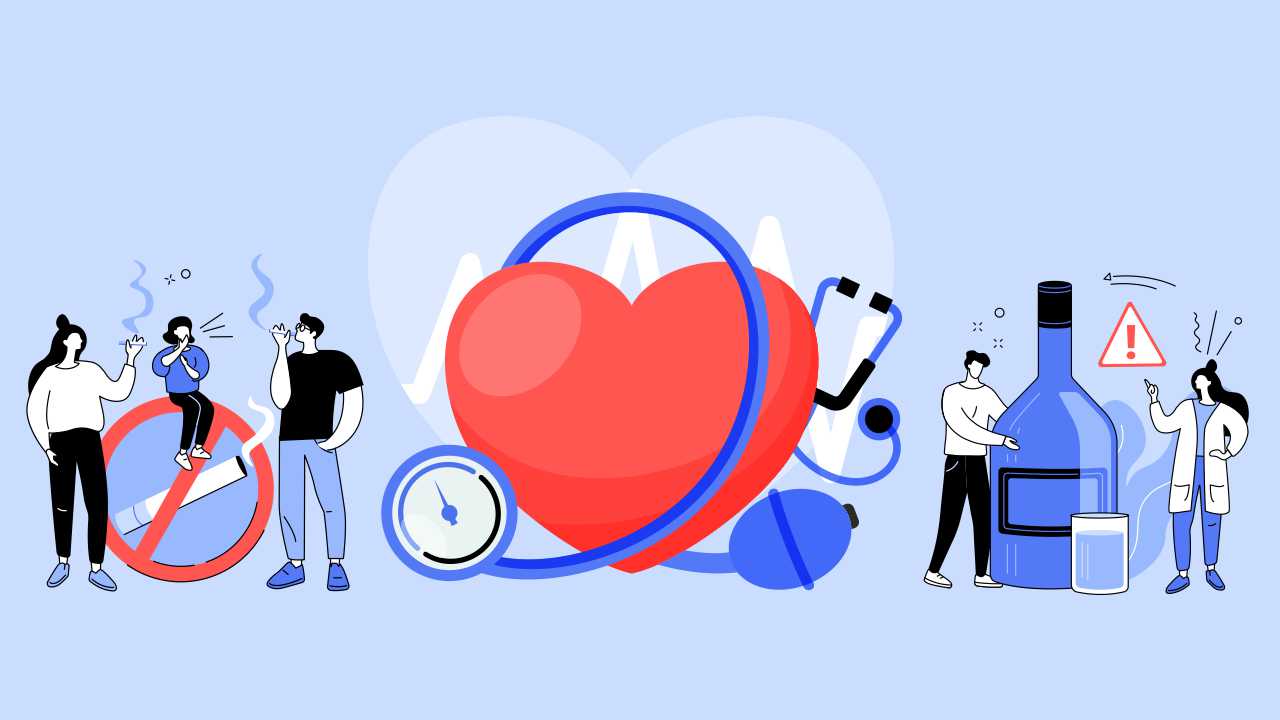
Effects of Long-term Alcohol Consumption and Smoking on Heart Health

It is not news that substance abuse, which includes smoking and excess alcohol consumption, can have serious and often long-lasting or irreversible effects on your overall health.
The adverse effects of smoking start as soon as an individual takes their first puff of smoke. Although the effects of smoking are more severe in people who smoke more or for longer, some of the harm can manifest even if you are someone who smokes occasionally. While these substances negatively affect the different systems in your body, let’s explore some of the effects on heart health.
How does smoking affect your heart?
Did you know that cigarette smoke contains more than 7,000 chemicals, many of them toxic and can cause cancers? Some of these chemicals include acetone, acetic acid, butane, cadmium, tar. When you smoke or are exposed to tobacco smoke, the harm caused to your health begins almost immediately owing to the poisonous substances present in the smoke. Carbon monoxide is one of the many toxic substances present in tobacco smoke. One of the consequences of inhaling tobacco smoke is the entry of carbon monoxide into the bloodstream; it reduces the oxygen-carrying capacity of the blood — leading to less oxygen being delivered to your tissues. This affects all tissues of the body, including the heart muscle.
Blood clots
Although blood clots are beneficial when it comes to stopping bleeding and promoting healing in response to cuts and bruises, the formation of clots within the body can be harmful. When you smoke, the chemicals in it alter blood chemistry; blood cells called platelets tend to clump together, making the blood thicker and stickier, leading to clot formations. Your heart may need to exert more effort to pump these clots through the vessels. More importantly, these clots can become life-threatening if they block the blood flow to the brain or heart.
Changes in lipid profile
Smoking can also alter your lipid profile. It can increase the levels of triglycerides and low-density lipoprotein (LDL) cholesterol or bad cholesterol, while causing a drop in the levels of high-density lipoprotein (HDL) cholesterol or good cholesterol. All these are major risk factors for increasing your risk for cardiovascular diseases like hypertension and atherosclerosis.
Increased risk of heart attack, stroke, coronary heart disease
The various chemicals present in tobacco smoke may also stiffen the walls of the arteries, make the blood more susceptible to clot formation and also contribute to plaque buildup within the arteries. All these factors eventually lead to the narrowing of the arteries, leading to blockage of blood flow to vital organs like the brain, kidneys, and even the heart. This results in compromised blood flow to these organs, which may manifest in the form of coronary heart diseases, strokes, and heart attacks.
How does your smoking affect others?
It’s not just your health at risk, your smoking may also jeopardize the health of those around you. Secondhand smoke is a combination of smoke from the burning end of the cigarette as well as the smoke that smokers breathe out. Inhaling secondhand smoke can expose individuals to the 7,000+ chemicals present in it. Just like with smokers, even occasional exposure to secondhand smoke can cause detrimental effects on the heart and blood vessels and increase the risk of cardiovascular conditions.
Can quitting smoking improve your heart health?
There is evidence that suggests quitting smoking can help improve your heart health. In fact, the earlier you quit, the better.
- The carbon monoxide level in the blood also returns to normal in about 12 hours after you quit smoking. This can result in more oxygen being available for the tissues and organs in your body
- Your circulation and lung function may improve in two to 12 weeks after quitting
- In one to nine months, incidences of shortness of breath may reduce
- After one year, the risk of coronary heart disease (CHD) may drop to about half of that of a smoker. After 15 years, the risk for developing coronary heart disease may become equivalent to a non-smoker
- Your risk of cardiovascular conditions like stroke also decreases. In five to 15 years after you quit smoking, your risk of developing a stroke decreases and may even be at the same level as that of a non-smoker
- 10 years after quitting, the risk of lung cancer may also lower and drop to be around half of that of a smoker
Quitting smoking is not an easy task, but with enough motivation and the right help and support system, you can achieve this. If you are a smoker and are concerned about your heart health, consult a physician.
Also read: Heart Health: How to Care for the Vital Organ
How does excess alcohol consumption affect your heart?
You may have read articles or commentary that talk about the positive effects of moderate alcohol consumption on overall health, especially heart health. However, it is important to note that research does not confirm that the optimum heart health seen in the subjects is directly related to the amount of alcohol consumed.
The good heart health observed could be attributed to many other factors as well, such as diet and lifestyle. The truth remains that since alcohol is not a natural part of the human diet, it affects the human body in unnatural ways and is harmful in the long run.
Given below are a few ways in which consumption of alcohol can affect the health of the heart and blood vessels in the long term.
Increased blood pressure
Increased blood pressure is one of the acute or short-term effects of alcohol consumption. Usually, this resolves in some time. However, binge drinking or continued alcohol consumption for several days may lead to sustained increased blood pressure. Long-term alcohol abuse may lead to chronic hypertension.
Moreover, alcohol has high levels of sugar and calories. Therefore, excess alcohol consumption can contribute to weight gain, and being overweight or obese is a major risk factor for hypertension and other cardiovascular conditions.
Irregular heart beats
Studies suggest that alcohol consumption, even in moderate amounts, may increase your risk for irregular heartbeats. This may lead to interrupted blood flow to the various organs of the body and also increase the chances of clot formation in the blood. A similar effect is seen in individuals who have indulged in binge drinking in the form of a condition called “holiday heart syndrome”. Without timely intervention, irregular heartbeats may cause further health complications like heart attacks, stroke, and kidney damage.
Cardiomyopathy
Cardiomyopathy is a condition that affects the heart muscle, making it enlarged, more rigid, and thick. It can weaken the heart muscles, which makes it more difficult for your heart to pump blood. Cardiomyopathy can increase the risk for other cardiovascular conditions like arrhythmias and heart failure.
Alcoholic cardiomyopathy, a kind of cardiomyopathy, is one of the conditions associated with long-term and excess alcohol consumption. Alcohol can have detrimental effects on the heart muscle, weakening the muscle and increasing the risk of developing cardiomyopathy.
High cholesterol levels
Long-term, excess consumption of alcohol and alcohol abuse are associated with high cholesterol levels. Increased alcohol consumption has also been linked with obesity, which in turn is associated with high cholesterol levels. High levels of cholesterol predispose an individual to plaque formations, which are major factors blocking blood flow in blood vessels and causing diseases like hypertension, heart attacks, and strokes.
Heart attack
Heavy drinkers may also be at an increased risk for heart attack. This risk is further increased if chronic alcohol use is accompanied by tobacco use. People who have a history of alcohol consumption tend to be at a higher risk of a heart attack later in their lives when compared to people who never indulged in alcohol abuse.
Can stopping alcohol consumption improve your heart health?
Alcohol consumption, especially long-term and excess alcohol abuse and alcohol abuse, can have many harmful effects on the heart that may increase your risk for cardiovascular conditions. Data suggests that in most cases, the damage caused may not be completely reversible. It is indicated that any resolution of damage may happen within the first few months to the first year of completely stopping alcohol consumption; the reversal later slows down. It is important to point out that any potential for improving your heart health also depends on focusing on and improving other factors such as diet, lifestyle, exercise, stress management, and rest.
How to moderate alcohol consumption?
Experts emphasize moderating alcohol consumption. Even then, regular or daily consumption of alcohol can carry with it potential health risks. Despite there being a recommended amount of alcohol that is considered as “low risk”, it is important to note that the effects of alcohol, even in smaller quantities may vary from person to person — factors like age, sex, weight, genetics, existing medical conditions, and any drugs or prescribed medications.
According to the US Dietary Guidelines 2015-2020, alcohol consumption should be limited to up to two servings per day for men and one serving per day for women. One serving of alcohol further depends on the percentage of alcohol in the drink you consume. One serving here is referred to as:
- 12 ounces of beer, which contains 5% alcohol on an average
- 148ml (5 ounces) of wine, which contains 12% alcohol on an average
- 44ml (1.5 fluid ounces) of 80-proof distilled spirits, containing about 40% alcohol on an average
However, daily consumption may be detrimental to your health, especially if you have any underlying health conditions or a family history of substance use disorders. Refraining from consuming alcohol is the safest way to avoid any adverse health effects caused by it.
Health-related circumstances where alcohol must be avoided
- Do not drink alcohol if you are on any medications, especially if there is chance they can react with alcohol
- If you suffer from any medical conditions, alcohol may lead to worsening of symptoms
- If you are pregnant or are trying to conceive or breast feeding, avoid alcohol consumption
- If you feel depressed or cold, or are unwell or tired, avoid alcohol consumption as it may worsen your condition
What you can do to keep your alcohol consumption in check
- Be informed about the standard drink amount and set limits for yourself
- Track your weekly and daily intake of alcohol
- Gradually try to switch some of the drinks with non-alcoholic beverages
- Choose drinks with lower alcohol concentrations
- Make sure to eat some food before you drink and drink slowly
- If you are dealing with alcohol addiction, do not hesitate to reach out for help. Seeking professional help and alcohol addiction programs can help you improve your health and quality of life
Also read: Heart: How to Prevent and Manage Cardiovascular Diseases
There is a complex relationship that exists between alcohol consumption and cardiovascular conditions. Although studies suggest that in healthy adults, regular low or moderate alcohol consumption may not generally cause any short-term effect on blood flow or blood pressure, this may not be the case for everyone. There are several factors like sex, genetics, nutrition, and any pre-existing medical conditions that can influence the effect of alcohol on your heart health.
References
1. A Report of the Surgeon General – How Tobacco Smoke Causes Disease. Centers for Disease Control and Prevention. https://www.cdc.gov/tobacco/data_statistics/sgr/2010/consumer_booklet/pdfs/consumer.pdf (accessed 30 Apr, 2021).
2. Smoking and Your Heart. Texas Heart Institute. https://www.texasheart.org/heart-health/heart-information-center/topics/smoking-and-your-heart/#:~:text=Research%20has%20shown%20that%20smoking,increases%20the%20risk%20of%20stroke. (accessed 3 May, 2021).
3. Reasons to Quit Smoking. American Lung Association. https://www.lung.org/quit-smoking/i-want-to-quit/reasons-to-quit-smoking (accessed 3 May, 2021).
4. Piano MR. Alcohol’s Effects on the Cardiovascular System. Alcohol Res 2017; 38: 219–41.
5. High Blood Pressure from Alcohol Consumption. American Addiction Centers. https://www.alcohol.org/effects/blood-pressure/ (accessed 4 May, 2021).
6. Alcohol Induced Cardiomyopathy Symptoms & Treatment. American Addiction Centers. https://www.alcohol.org/comorbid/cardiomyopathy/ (accessed 4 May, 2021).
7. Low-risk alcohol drinking advice. Te Hiringa Hauora. https://www.alcohol.org.nz/help-advice/advice-on-alcohol/low-risk-alcohol-drinking-advice (accessed 4 May, 2021).
8. How Long Does It Take to Reverse Alcohol Damage? American Addiction Centers. https://americanaddictioncenters.org/health-complications-addiction/reverse-alcohol-damage (accessed 4 May, 2021).
9. Tobacco: Health benefits of smoking cessation. World Health Organisation. https://www.who.int/news-room/q-a-detail/tobacco-health-benefits-of-smoking-cessation#:~:text=2%2D12%20weeks%2C%20your%20circulation,to%2015%20years%20after%20quitting(accessed 4 May, 2021).
10. Smoking and Cardiovascular Disease. Surgeon General’s Report on Smoking & Health. Centers for Disease Control and Prevention. https://www.cdc.gov/tobacco/data_statistics/sgr/50th-anniversary/pdfs/fs_smoking_CVD_508.pdf (accessed 4 May, 2021).













